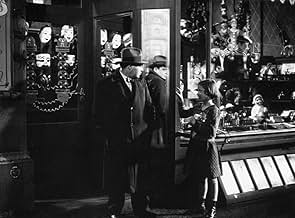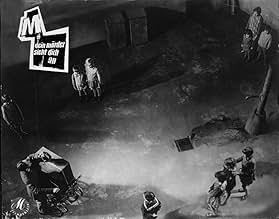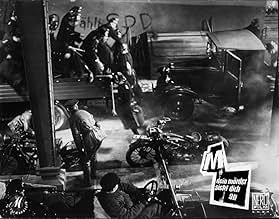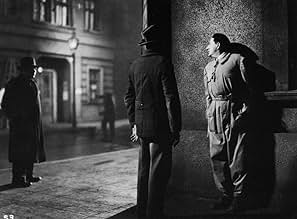जब जर्मन शहर में पुलिस एक बाल-हत्यारे को पकड़ने में असमर्थ होती है, तो अन्य अपराधी मैनहंट में शामिल हो जाते हैं।जब जर्मन शहर में पुलिस एक बाल-हत्यारे को पकड़ने में असमर्थ होती है, तो अन्य अपराधी मैनहंट में शामिल हो जाते हैं।जब जर्मन शहर में पुलिस एक बाल-हत्यारे को पकड़ने में असमर्थ होती है, तो अन्य अपराधी मैनहंट में शामिल हो जाते हैं।
- पुरस्कार
- कुल 2 जीत
कहानी
क्या आपको पता है
- ट्रिवियाContrary to popular belief, Fritz Lang did not change the title from "The Murderers are Among Us" to "M" due to fear of persecution by the Nazis. He changed the title during filming, influenced by the scene where one of the criminals writes the letter on his hand. Lang thought "M" was a more interesting title.
- गूफ़In one of the police crack-down scenes, the German bar hostess keeps referring to the uniformed police officer in charge as "Herr Hauptmann." The English caption translates this as "sergeant." But, in actuality, "hauptmann" is equivalent to "captain".
- भाव
Hans Beckert: I can't help what I do! I can't help it, I can't...
Criminal: The old story! We never can help it in court!
Hans Beckert: What do you know about it? Who are you anyway? Who are you? Criminals? Are you proud of yourselves? Proud of breaking safes or cheating at cards? Things you could just as well keep your fingers off. You wouldn't need to do all that if you'd learn a proper trade or if you'd work. If you weren't a bunch of lazy bastards. But I... I can't help myself! I have no control over this, this evil thing inside of me, the fire, the voices, the torment!
Schraenker: Do you mean to say that you have to murder?
Hans Beckert: It's there all the time, driving me out to wander the streets, following me, silently, but I can feel it there. It's me, pursuing myself! I want to escape, to escape from myself! But it's impossible. I can't escape, I have to obey it. I have to run, run... endless streets. I want to escape, to get away! And I'm pursued by ghosts. Ghosts of mothers and of those children... they never leave me. They are always there... always, always, always!, except when I do it, when I... Then I can't remember anything. And afterwards I see those posters and read what I've done, and read, and read... did I do that? But I can't remember anything about it! But who will believe me? Who knows what it's like to be me? How I'm forced to act... how I must, must... don't want to, must! Don't want to, but must! And then a voice screams! I can't bear to hear it! I can't go on! I can't... I can't...
- क्रेज़ी क्रेडिटAll of the original credits appear only in the beginning with no music.
- इसके अलावा अन्य वर्जनIn the English and French language versions, in addition to having been dubbed, had some footage re shot. These scenes include the telephone conversation between the minister and the police commissioner, and the ending of the film. Peter Lorre's performance in the trial was re shot, however this time he spoke his lines in English or French, depending upon the version. The shots of him are lit and photographed much differently than Fritz Lang's original footage. Additionally, a shot of the police arriving was inserted, taken from an earlier part of the film (whereas in the original German version no police forces are shown at all). The court scenes have been eliminated and replaced with happy endings where young children play a game similar to the one seen in the opening (English) or a smiling couple watching their children play in the street (French).
- कनेक्शनEdited into Juden ohne Maske (1937)
The murderer, artfully played by Peter Lorre, has been killing children that have no link to him personally for months. The police, despite all of their efforts, are unable to catch him, mainly because there is no rhyme or reason in his choice of victims. At first there is a focus on the victims and the hole left in their families by their killing. Then, the film shifts to two normally opposed groups - the police and the underworld. After several months of no results by the authorities, the police are unhappy because it reflects badly upon them, and the underworld is unhappy because their activities are being disrupted because of the police doing constant raids in their efforts to capture the killer.
In a particularly well-done part of the film the scene shifts back and forth between a conference of police and one of the underworld. They discuss how they are going to catch the killer. The police settle upon the idea of looking for people with a history of past mental problems that were pronounced cured and released. The underworld decides to enlist an invisible group - the beggars - to follow every child at all times and therefore catch the killer. Both groups focus on the right suspect, the question is - who gets there first? M is a fascinating film that raises many topics - the death penalty, a group of criminals that are criminals by choice causing less stress on society than a lone criminal that acts out of an uncontrollable compulsion, and the motivations of the authorities often being their own bureaucratic survival rather than the larger issue of ending a series of horrible acts against humanity.
टॉप पसंद
- How long is M?Alexa द्वारा संचालित
विवरण
- रिलीज़ की तारीख़
- कंट्री ऑफ़ ओरिजिन
- भाषा
- इस रूप में भी जाना जाता है
- M - Eine Stadt sucht einen Mörder
- फ़िल्माने की जगहें
- उत्पादन कंपनी
- IMDbPro पर और कंपनी क्रेडिट देखें
बॉक्स ऑफ़िस
- US और कनाडा में सकल
- $35,566
- US और कनाडा में पहले सप्ताह में कुल कमाई
- $6,123
- 17 मार्च 2013
- दुनिया भर में सकल
- $35,566
- चलने की अवधि1 घंटा 57 मिनट
- रंग
- ध्वनि मिश्रण
- पक्ष अनुपात
- 1.19 : 1
- 1.20 : 1
इस पेज में योगदान दें


































